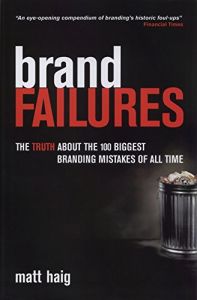Join getAbstract to access the summary!

Join getAbstract to access the summary!
Matt Haig
Brand Failures
The Truth About the 100 Biggest Branding Mistakes of All Time
Kogan Page, 2004
What's inside?
If you learn more from failure than success, here`s how to become a branding expert: study 100 flops. Want a New Coke?
Recommendation
Branding is a ubiquitous, but critical marketing function that can produce spectacular successes and catastrophic blunders. Highly visible branding failures, such as the ill-fated "New Coke" or Harley Davidson's silly attempt to peddle perfume, are first-order marketing blunders. Yet, while branding is critical, one wonders if branding alone, as author Matt Haig asserts, is the main reason Land Rover sales declined and General Motors stopped making Oldsmobiles. Other experts might address such failures from a more expansive perspective, citing financial, competitive, managerial, global and environmental factors. Haig notes that non-branding mistakes contribute to failure, but focuses on branding as the prime cause. As a result, his brand-centered explanations can seem strained, but he overcomes this concern with a long list of vignettes that effectively drive home important points about the causes of branding failures. getAbstract suggests this book to marketing, advertising, PR and customer service managers so they can learn from other people's mistakes.
Summary
About the Author
Matt Haig is an independent consultant who advises corporations on branding and marketing. He is the author of Mobile Marketing: The Message Revolution. He also wrote E-PR: The Essential Guide to Public Relations on the Internet, E-Business Essentials, E-Mail Essentials, The E-Marketing Handbook, The B2B E-Commerce Handbook and If You're So Brilliant, How Come You Don't Have An E-Strategy?
















Comment on this summary